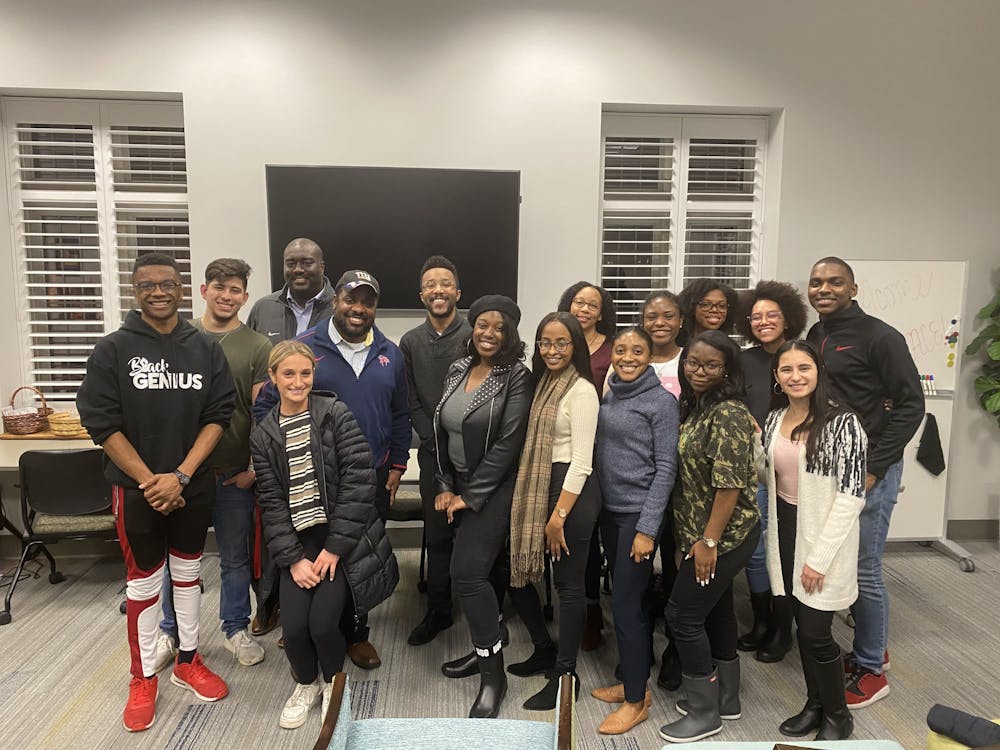The Black Student Alliance hosted five University of Richmond alumni Monday night for “Untold Stories: Voices of Black Alumni,” a panel in which alumni answered questions about their experiences being students of color at UR.
Sophomore Jordyn Lofton, the Black History Month chair for BSA, coordinated the event, which took place in the Multicultural Space in Whitehurst.
Lofton began by asking the alumni what their best experience on campus was.
Among four of the alumni, highlights included academic and artistic achievements, participating in residence life and being part of a fraternity.
For Jasmonn Coleman, ’98, the best experience was graduating.
Coleman was not involved with many organizations or student groups other than the football community, he said. All of his great experiences with the university have come since graduating, as he is now the associate athletic director at UR and fundraises within the athletic department.
Allison Johnson, ’19, said she had a very difficult experience during her time on campus.
“A lot of people have that experience when you realize you’re black in America, and I realized that very late because it was as soon as I got here that I truly felt that,” Johnson said.
Despite going to a private high school and being used to being the only black person in a room, it was only when she got to UR that she felt hostility or experienced microaggressions, Johnson said.
“It’s just something I didn't expect when I came here and took the tour,” she said. “I wasn’t expecting that type of environment, not necessarily being accepted by a large portion of the students.
“But I wouldn’t take it back, because it gives you a better picture of what the world is like.”
Junior Kevin A. Villagomez asked the panel how to combat microaggressions.
Enjoy what you're reading?
Signup for our newsletter
The best way to combat microaggressions are to kill people with success, to call them out respectfully or to thrive in situations you’re not supposed to, said Jackson Knox, ’12.
“Kill them with success, which you’re already doing,” he said. “You’re already at UR. You weren’t even supposed to be here 50 years ago.”
Knox was called a racial slur during his time at UR, he said. He also encountered microaggressions such as classmates playing with his hair and segregated seating in the Heilman Dining Center. He was grateful he had strong white allies who would have had his back if an issue were to arise, he said.
It’s difficult to know whether to confront or walk away from a microaggression, Coleman said, because every situation is different. When confronted with one, Coleman said he had struggled with deciphering whether he was overanalyzing the situation.
He recalled one night during his freshman year when he was walking near Moore Hall and somebody called him a racial slur from a distance. In that case it was a no-brainer to confront the issue, which didn’t end well for the name-caller, he said. Now he doesn’t think he could get away with that type of response though, he said.
He suggested that students combat microaggressions in whatever way is best for them individually. Students should find a way to handle it so it doesn’t suck the energy out of them, because then the aggressors win, he said.
In response to Villagomez, Johnson said: “Ask them to repeat what they said because it will give them an opportunity to think about it. I don’t think there’s anything wrong with a little bit of public shame, especially if the person is saying that to you in public, because they’re putting the shame on you. If you question what they say, you’re putting it back on them.”
Rasheeda D. Perry, ’03, had a professor who would ask questions in class and ignore her when she answered correctly but would acknowledge when a white student would answer, she said. She said encountering microaggressions is challenging but makes you grow and gives you a picture of the world and how to be able to stand up without letting it crush you.
Ed Gates, ’02, experienced his first encounter with microaggressions on campus when a professor, who was an older white man, stopped a class to ask why Gates was not in New York with the rest of the football team. Gates was at UR on an academic scholarship and was not an athlete.
“There were moments on this campus when I would go a day without seeing anybody who looked like me,” Gates said.
He went to a predominantly white military high school, but he said it was different for that to happen in college because this was his environment 24/7, and he couldn’t go home to his parents for dinner.
During Gates’ freshman year, somebody in his dorm told him he had never seen a black person, he said. Gates had breakfast with that student, who he still keeps in touch with, every day during the semester. During that time Gates answered questions about race, which were sometimes ignorant but never harmful. It is always better to ask rather than assume when it comes to racial questions so that true conversation can happen, he said.
The BSA will host more events this week to commemorate Black History Month and celebrate black excellence, such as Chocolate and Chill: Movie Night on Feb. 13 in The Web.
Contact contributor Sofia Badalamenti at sofia.badalamenti@richmond.edu.
Support independent student media
You can make a tax-deductible donation by clicking the button below, which takes you to our secure PayPal account. The page is set up to receive contributions in whatever amount you designate. We look forward to using the money we raise to further our mission of providing honest and accurate information to students, faculty, staff, alumni and others in the general public.
Donate Now



